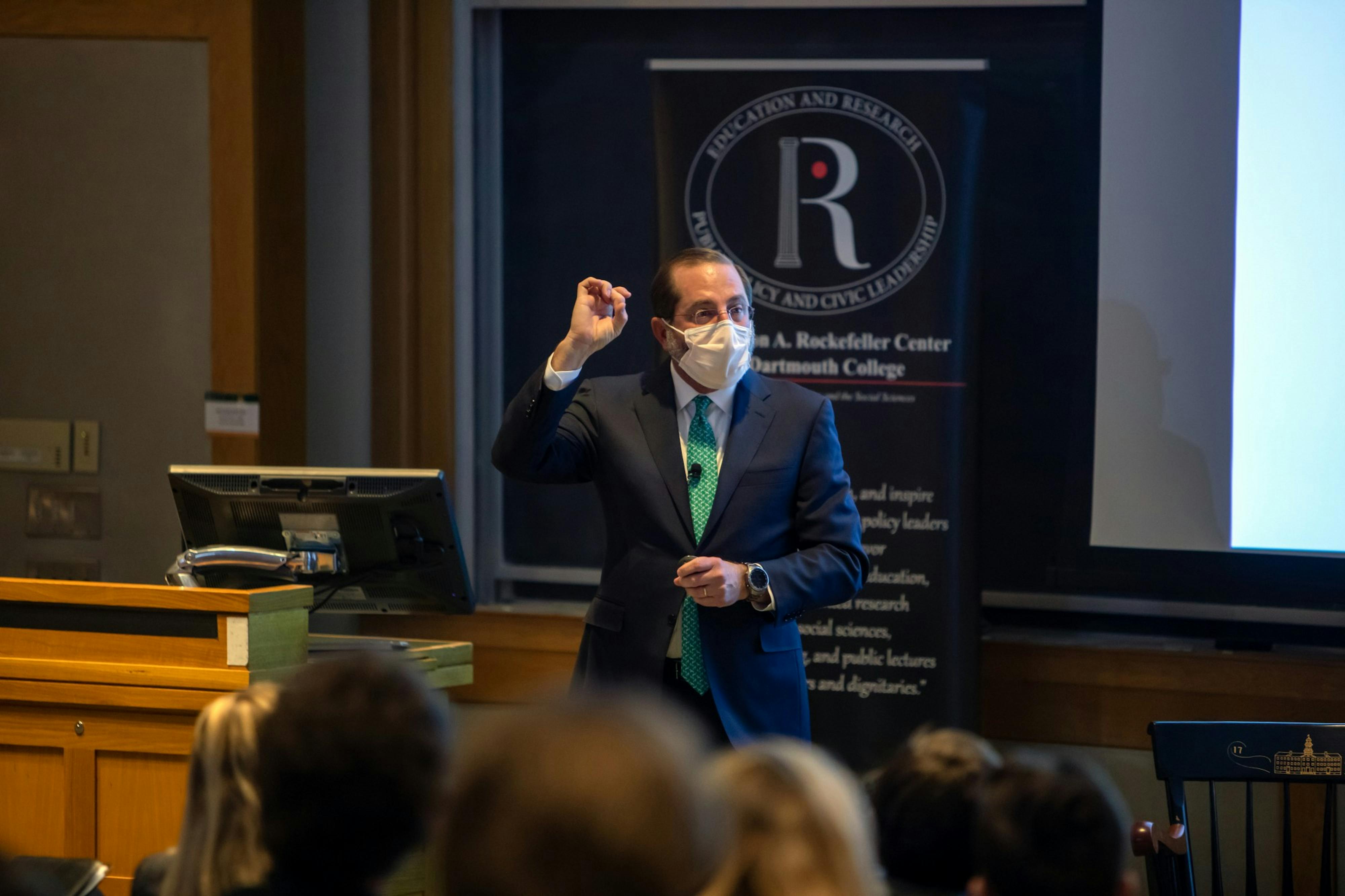Rockefeller Center hosts former Health and Human Services secretary Alex Azar ’88
Azar spoke about his work on Operation Warp Speed and his experiences as HHS Secretary during the Trump administration.

On Monday evening, the Rockefeller Center for Public Policy hosted former U.S. Health and Human Services secretary Alex Azar ’88 in a talk entitled “Operation Warp Speed: Lessons from the Most Successful and Important Public-Private Partnership Since the Apollo Project.” Addressing a live audience in Filene Auditorium, Azar spoke about his work to plan and execute “Operation Warp Speed,” a federal effort during the administration of former president Donald Trump to support and speed up private development of COVID-19 vaccines.
While serving as HHS secretary under Trump, Azar also served as chair of the White House Coronavirus Task Force from January until February 2020, when former vice president Mike Pence replaced him in the role. Prior to joining the Trump administration, Azar was general counsel and deputy HHS secretary under former president George W. Bush and served as president of the U.S. division of Eli Lilly and Company, a pharmaceutical company.
Since Azar resigned from his position in Jan. 2021, his response to the coronavirus pandemic has attracted criticism, including from health professionals citing Azar’s delay in alerting Trump to the threat of COVID-19 and the CDC’s decision to develop and distribute its own COVID-19 tests rather than requesting them from the World Health Organization.
Government professor Jason Barabas said in an interview after the event that Azar’s lecture took place as part of the Brooks Family series, a lecture series funded to “foster a balanced discussion on campus of national and international issues.” Barabas said that as the former head of one of the largest cabinet agencies in America, Azar is a guest of “national stature.”
“During a time when we’re confronting a global pandemic, he’s got real world policy experience that is exceptionally relevant to what’s going on today,” Barabas said. “He’s widely credited as being the architect of Operation Warp Speed — I think that’s interesting in its own right, especially in this case where the government and private sector could work together to essentially speed up the development of vaccine therapeutics.”
Azar began the discussion by describing the unprecedented timeline of the COVID-19 vaccine development. While vaccine development typically takes between 10 and 15 years, Azar said that within “just a couple of months,” around "100 candidate vaccines against [COVID-19] had been developed."
“We spent $2 trillion of taxpayer money in March of 2020 to deal with the consequences of COVID relief,” Azar said. “Effectively, any amount of money that you could credibly spend that would bring vaccines sooner and help either prevent infection or reduce the risk of hospitalization for people is going to have an infinite return on investment.”
Azar added that his time in the pharmaceutical industry gave him “exposure to the drug industry,” as well as an understanding of how difficult drug manufacturing can be. Faced with the COVID-19 pandemic, Azar said the administration adopted a “Manhattan Project attitude,” harnessing the “full power” of the U.S. government and public-private partnerships.
According to Azar, the administration set a goal to have FDA-authorized vaccines ready by the end of 2020, with enough vaccines for every American by the beginning of 2021.
“I reached out to many of my cabinet colleagues — Defense Department, Veterans Affairs, Homeland Security, Agriculture, the Energy Department,” Azar said. “[Government] powers are incredible — they have to be applied where there’s the political will to apply them.”
Adding to this, Azar said that governmental power had to be leveraged alongside the private sector.
“Warp Speed is this bright light of action that grants hope,” Azar said.
During an audience Q&A session, Azar described the lessons he learned during the Bush administration’s handling of the severe acute respiratory syndrome virus, including the “importance of transparency.”
“We’ve got to have complete transparency around these infectious diseases wherever they occur in the world — unfortunately, I don’t think we saw that in this case from China initially,” Azar said. “It’s not one country’s problem to try to solve.”
Azar also responded to an audience question regarding public-private partnerships and declining trust in experts within today’s Republican Party, again emphasizing the importance of transparency.
“From a public health perspective, improving our data systems, improving the coordination around the diagnostics industry, preparedness and early countermeasures make [vaccine development] a more predictable, streamlined approval process,” Azar said. “The politics around this, as more of a technocratic person, have been different for me.”
Michael Guptill ’22 said she came to the lecture to learn more about Azar’s perspective on the COVID-19 vaccine development.
“I didn’t know that he pulled all the levers to bring the whole operation together,” Guptill said. “It’s really cool to hear how they thought through the problem to successfully coordinate a solution.”
Blake McGill ’22, a public programming assistant at the Rockefeller Center, said she had met Azar previously during a public policy class.
“We didn’t delve into the nitty gritty of Operation Warp Speed, so I did not expect him to go step by step and talk about all the business principles,” McGill said. “I knew that he had had private sector experience, but I didn’t understand all of the insights on the manufacturing side and the business practices he was able to bring into the government and adapt for the public sector.”
Blake McGill is a former member of The Dartmouth staff.
During the talk, Azar discussed the unprecedented timeline of the COVID-19 vaccine and leveraging relationships between the government and private sector.




Nessun commento:
Posta un commento